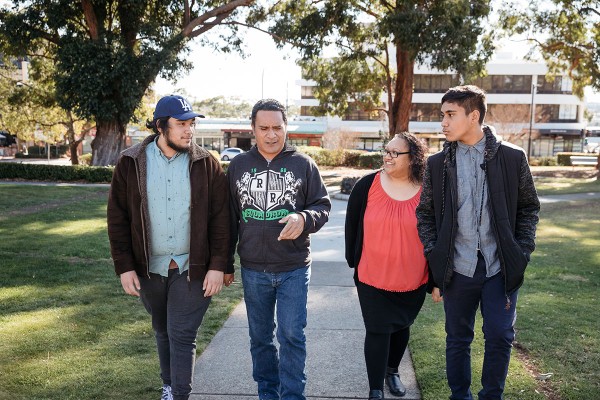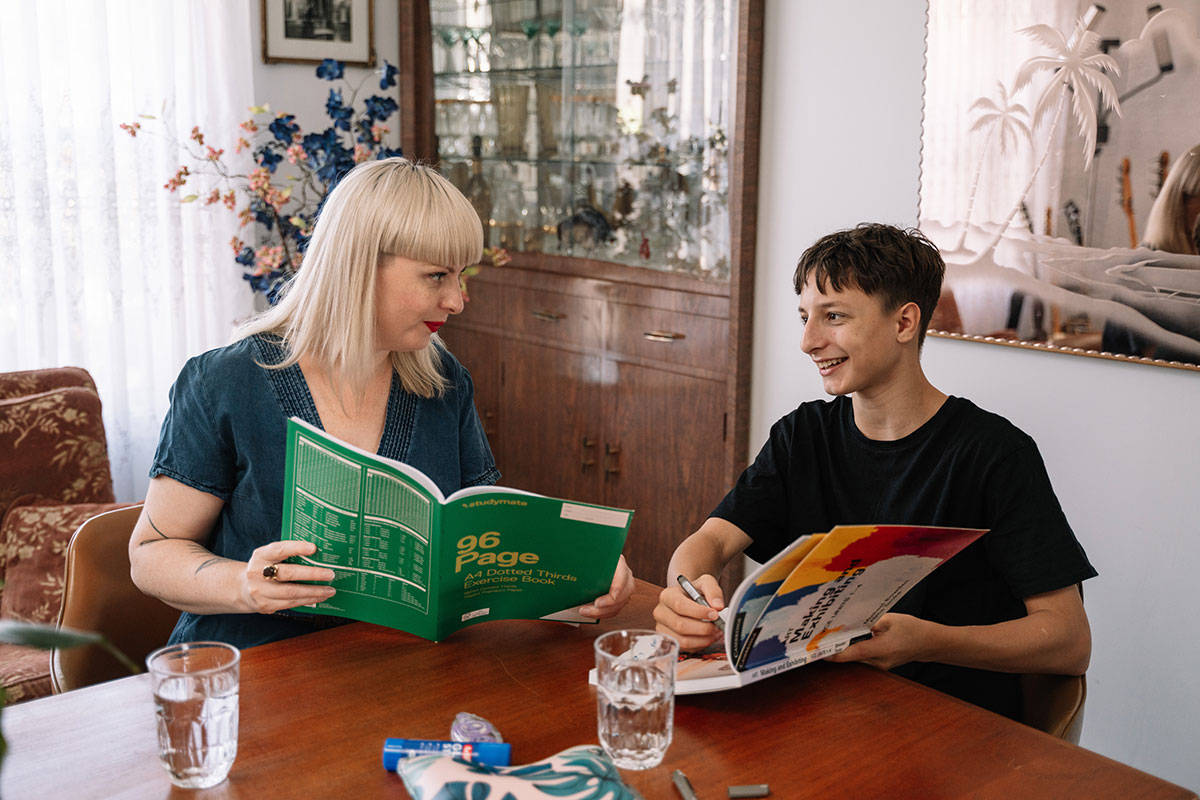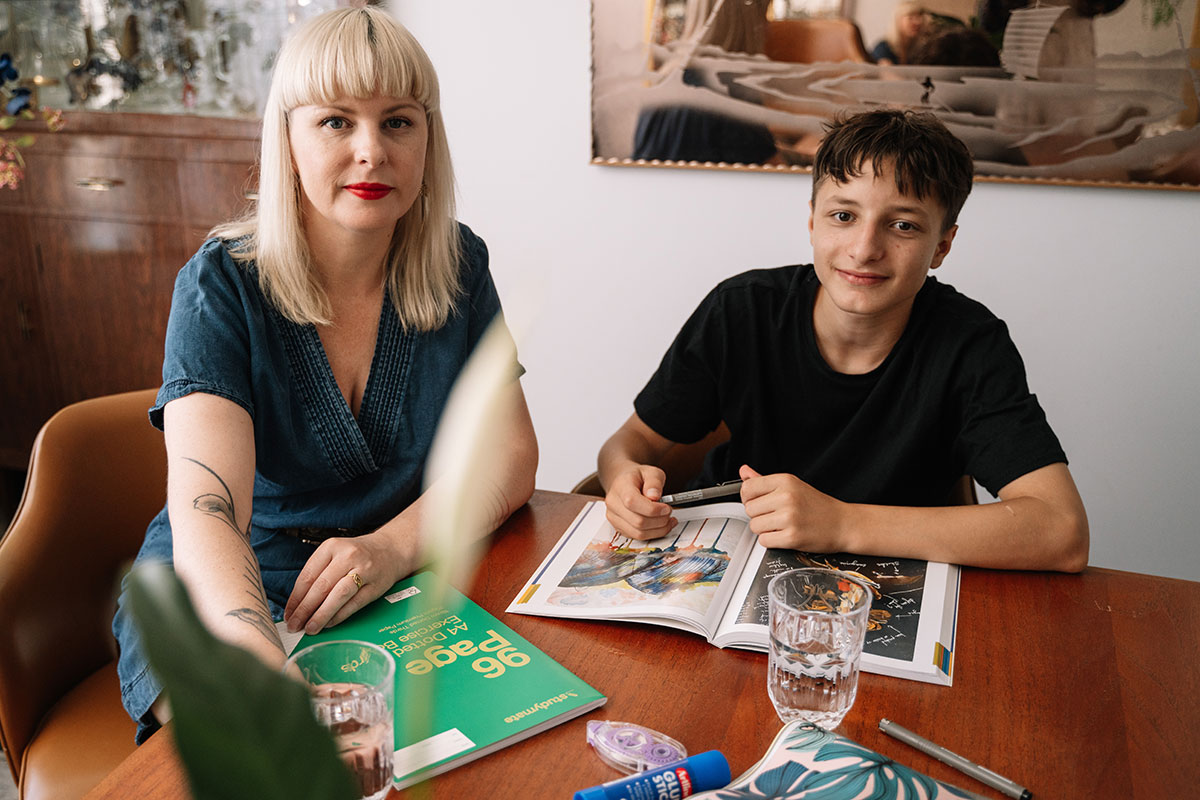Many young people are going through a lot of change, and this can affect their motivation to study. Whether your young person is in high school or doing other study, this article gives you practical tips and ideas for helping them to develop study skills and habits that work for them.
Exploring barriers to motivation in teenagers and young people
Low motivation can be caused by a variety of factors, often connected. Before exploring ways to help your young person feel motivated to study, it’s important to first understand what might be getting in their way. Identifying the challenges they face – whether it's a lack of confidence, an undiagnosed condition, or feeling overwhelmed – is the first step. By being proactive and helping them address these issues, you can better support them. Here are some common factors:
Big changes and stressful events can affect a young person’s ability to focus on study. This can include changes in the family, such as the birth of a sibling or separation of parents; moving to a new country, house, town/city or place of study; or the loss of someone or something close to them. Relationships with friends or romantic partners can also influence motivation. Conflicts or emotional challenges in relationships can create distractions or emotional strain, potentially affecting their ability to concentrate on schoolwork. However, it’s important to note that friends or partners can also offer encouragement and motivation to study.
Sometimes a young person will feel they must meet high expectations from family or supporters, even if these expectations haven’t been directly expressed. They might also compare themselves critically to their peers or influencers on social media, which can lead to low self-esteem. This low self-esteem can further affect their motivation, as they may struggle with feelings of inadequacy or doubt their abilities. Low expectations from others can also impact motivation, as young people may sense a lack of belief in their potential, which can diminish their drive to excel academically.
If a young person is experiencing challenges with their mental health, it can affect their lives in different ways. It can impact their capacity to focus, remember things, get enough sleep, set and stick to goals, and stay motivated to study. For some young people, this can lead to feeling like things are getting out of control or that they are not up to the task, especially if they have high expectations of themselves.
Neurodevelopmental disorders such as intellectual disabilities, Autism Spectrum Disorder (ASD), Attention Deficit Hyperactivity Disorder (ADHD), and learning disabilities such as dyslexia, dysgraphia, and dyscalculia can significantly contribute to low motivation to study. These conditions can make academic tasks more challenging and frustrating, leading to feelings of inadequacy and discouragement. Some teenagers may find it challenging to maintain focus, stay organised, understand material, or communicate effectively, which can affect their ability to keep up with coursework. Without appropriate support and modifications or allowances, these difficulties can lead to a lack of engagement and interest in studying. It’s important to consider that a young person may be experiencing low motivation due to one of the conditions listed above, even if it hasn’t been recognised or formally diagnosed.
Chronic health conditions and physical disabilities can drain energy and focus, making it more difficult to concentrate and stay engaged with studies. When a young person is dealing with ongoing health issues, they might find it harder to keep up with their schoolwork and may experience increased mental and physical fatigue. This can lead to feelings of frustration and decreased motivation, as the effort required to balance their health needs with their academic responsibilities can feel overwhelming.
For families in multicultural and First Nations communities, schooling expectations and experiences can differ. Young people may feel pressure to succeed due to financial sacrifices made by their families or fear of letting someone down. This pressure, along with potential feelings of being academically behind, especially when English is not their first language, can lead to increased stress and anxiety. The need for additional support, such as language or learning aides, might also impact their motivation.
In these diverse cultural contexts, family and community responsibilities can take precedence, and experiences of discrimination or living in busy multigenerational households can further challenge a young person's ability to prioritise academic achievement.
Young people may face bullying, negative interactions with teachers, or challenges with certain subjects, all of which can impact their motivation. Subjects that they’ve chosen earlier in their high school career may also leave them feeling trapped and regretful.
Teenagers can feel disconnected from their high school education if the pathway from their current studies to their future goals is unclear. When they can't see the real-world relevance or potential benefits of what they are learning, it can lessen their sense of purpose and motivation. This can be related to feelings of uncertainty about the future or career direction.
Limited access to a study space, technology, or other resources can hinder a young person's ability to study effectively. Without the necessary tools and environment to support their learning, they may struggle to focus on their studies.
Low motivation to study: what you might notice in your teenager
While it's normal for young people to simply feel unenthusiastic or disinterested in some tasks, it is important to differentiate when this lack of motivation is occurring due to an underlying, more complex issue. Recognising and understanding the signs of low motivation can help you to manage your expectations, but also to provide support if your young person is having a tough time.
Often, a cycle forms: disengagement leads to reduced participation in studies, which leads to poor grades, which in turn leads to even lower motivation. Low motivation can affect young people in many ways, such as:
Mental health and wellbeing
Your young person might show overall changes in mood, such as increased irritability or moodiness. They may feel isolated or directionless, which can lead to withdrawal and lower self-esteem. These thoughts and feelings can also worsen existing mental health conditions.
Observable behaviours
You might notice defiant or risky behaviours, dishonesty about schoolwork, changes in eating and sleeping patterns, avoidance of school-related conversations, or changes in hygiene or self-care. Relationships with family and friends might suffer, and the young person might engage in unhealthy coping strategies like substance use.
Subtle signs
Your young person might not ask for help because they don't want to bother others, or feel it's not worth it. They might lack confidence in their future or lose interest in further studies. These challenges can often be subtle, even to themselves, and they may not be able to communicate these thoughts and feelings clearly.
School-related issues
They might disengage from school, do the ‘bare minimum’ to avoid raising flags, or struggle with relationships with their teachers. They might also try to avoid school without being able to articulate why.
10 ways to support teenagers and young people to find motivation when studying
Tip 1: ask what they need
Communicate openly with your young person and ask them questions that encourage them to share what kind of support they might need from you. It’s important to recognise that they may not always be able to articulate their needs clearly, and you might need to help them unpack their thoughts and feelings. Try to encourage them to express their needs and guide them in their own decision-making without assuming what they might need. By fostering autonomy in decision-making, you can empower them to express their challenges and preferences. This approach can allow you to provide targeted support that aligns with their individual goals and aspirations.
Tip 2: explore different learning styles
Help your young person to discover the learning methods that suit them best. Some students might thrive with visual aids, while others might prefer hands-on activities or listening to explanations. You could try introducing various study techniques like the Pomodoro method, which involves breaking study time into intervals with short breaks, and study scheduling to manage their time effectively. Encourage them to try different approaches until they find what works best for their unique learning style. This can make studying more engaging and less overwhelming.
Tip 3: encourage individuality
Remind your young person that everyone learns differently and at their own pace. Focusing on their own progress rather than comparing themselves to others is crucial because it helps build self-confidence and reduces unnecessary stress. Encourage them to embrace their unique learning style and strengths and reassure them that their own personal journey is valid and important, regardless of how it may differ from their peers.

Tip 4: revisit the ‘purpose’
Help them understand the benefits of learning certain subjects and how they relate to their future goals. Discuss how their current studies can open doors to opportunities and nurture skills that they might need in their desired career. Encourage activities like work experience and job tasters to help them discover their interests and strengths. This can make their studies feel more meaningful and relevant, motivating them to stay engaged and focused.
Tip 5: lead with empathy
Demonstrate empathy by listening attentively to their concerns and difficulties. Take a moment to listen thoughtfully before offering a solution to their concern. Sometimes your young person just needs to feel heard without judgement. When they do speak about their concerns, validate their feelings and reassure them that you are there to support them. This can show them that you really want to understand their experiences and provide supportive guidance. It can be helpful to acknowledge that everyone communicates differently, and offer encouragement as they navigate their feelings and thoughts. After acknowledging their concerns, ask them how they think you can best support them moving forward. By working together with your young person, instead of fixing things for them, they can feel empowered by having a sense of autonomy over their choices.

Tip 6: normalise challenges
Help them understand that facing challenges is a normal part of learning and growth. You could emphasise that it's okay to progress at their own speed and that setbacks are sometimes opportunities for learning. Encourage them to define what ‘success’ and ‘failure’ actually means to them, focusing on personal growth and effort rather than what others expect. Discussing and exploring this together can strengthen your connection and provide reassurance, helping them feel supported as they navigate their journey.
Tip 7: encourage healthy habits
Support them to set up daily routines that include dedicated study times and self-care activities. Encourage them to find a balance between their academic responsibilities and activities that promote their well-being, such as exercise, relaxation techniques, hobbies they enjoy or spending time with friends. Joining in these activities with your young person can not only strengthen your relationship but also provide a sense of connection.
Tip 8: explore options
Exploring alternative schooling options may be a valuable step in addressing low motivation to study. For some young people, traditional schooling does not align with their learning needs or interests. Alternative schooling options in your local area may offer different educational approaches that might better engage students. This can include options to have individual learning plans or reasonable adjustments made within their current course or school. These options can provide the same future tertiary study pathways and employment opportunities as mainstream schooling. For instance, young people who have not completed mainstream school can still qualify for university entry through TAFE studies or adult entry options.
Distance education can provide flexibility for those who thrive in a self-paced learning environment.
In some cases, leaving school altogether and pursuing vocational training, apprenticeships, or entering the workforce may be appropriate. Make sure to check your state Education Department’s website for specific laws and regulations about school enrolment ages and the requirements for leaving school, so you can make an informed decision.
It's important to have open discussions about these options and seek professional advice. Websites like the Australian Government's myfuture and the Department of Education in your state or territory offer comprehensive information on various educational pathways and support services.
Across Australia, there are also specific policies and initiatives to support culturally inclusive, non-discriminatory schooling environments. These may be accessible Australia-wide, such as the National Agreement on Closing the Gap or specific to each state or territory. Exploring these options can help find the right fit and reignite a young person's enthusiasm for learning.

Tip 9: set clear expectations and goals
Sit down together to discuss and agree on goals that are realistic and achievable. While grades are important, it could be helpful to emphasise the importance of effort and improvements in behaviour. Generally, when effort and behaviour improve, grades often follow naturally. Define what putting in effort actually looks like from their perspective as well as your own, and how they can demonstrate this. Effort may look like allowing more time for their studies or engaging in notetaking in-class. This approach not only helps them understand the path to success but also encourages them to take charge of their learning journey. Remember to check in regularly, adjust goals as necessary, and celebrate their progress to keep them motivated.
Tip 10: seek support
Encourage your young person to reach out to their teachers and to use the support services available where they are enrolled, such as guidance counsellors, student services or tutoring programs for academic help. You could offer to help arrange these discussions or accompany them if they feel comfortable with that. Remind them of the importance of seeking professional mental health support if they are dealing with emotional or psychological challenges related to their studies. Additionally, consider consulting with a GP or psychologist to better understand their individual needs, including potential diagnoses that may help tailor their learning environment. However, it's important to acknowledge that accessing these services can be costly and time-consuming, and may not be an option for everyone. In such cases, making the most of the resources and supports that are available at their study institution can still make a significant difference.

Looking after yourself
While it can be hard to think about your own needs when you are worried about a young person, it’s important to look after yourself. It might be that the difficulties affecting your young person are also affecting other people in the family, including you. Watch for signs that you might not be doing well, like not sleeping well, feeling irritable, or getting upset easily. Reach out for your own support, whether from friends and other adults in the family, or professional support. Looking after yourself can help you support your young person and shows them the importance of self-care.

Supporting young people through their educational journey can be challenging, but you're not alone. It's essential to prioritise your own well-being by seeking support and celebrating small achievements along the way. Every family's path is unique, and exploring different strategies can help you discover what works best for each young person. If you see your young person becoming more engaged in schoolwork, developing a more positive attitude towards learning, or communicating better about their goals and challenges, it's a good sign that you're both moving in the right direction. Remember, each small step forward is a significant achievement!
Get support from headspace Work and Study
If your young person is aged 15 – 25, the headspace Work & Study programs are tailored to their needs and can support them in developing the skills and confidence to reach their work or study goals. It’s totally free and we have options for them to participate online via webchat, video chat or phone, as well as in-person at over 50 of our headspace centres.
Find out more to help them decide which headspace Work & Study service best suits their needs. If you’re not sure and would like to discuss some options, give us a call on 1800 810 794.
Other useful resources and supports
Mental health support
headspace - for support with mental health and wellbeing, find your nearest headspace centre or access online and telephone support via eheadspace.
Kids Helpline – free, confidential 24/7 online and phone counselling service for young people aged 5 to 25.
Lifeline - national charity providing all Australians experiencing emotional distress with access to 24-hour crisis support and suicide prevention services.
Reach Out – self-help content, community forums, and one-on-one support for parents and carers.
Wellmob - social, emotional and cultural wellbeing online resources for Aboriginal and Torres Strait Islander people.
Education support
Australian Government Department of Education - find important, state-specific school information for schools, students and parents.
Study Australia – support services and resources for International Students and families.
MyFuture - information, tools and articles for parents and carers.
School Leavers Information Kit | Your Career - the School Leavers Information Kit (SLIK) can help you make the next move. You might discover new passions, develop valuable skills or learn more about what you want out of life.
Parents and guardians guide | Your Career - A guide that summarises the resources and information available to help you explore all the education, training, and work options available to your young person.
You can also look up the Department of Education website in your state or territory for comprehensive information on various educational pathways and local support services.
The headspace Content Reference Group oversee and approve clinical resources made available on this website.
Last reviewed September 2024.
Australian National University. (n.d). Managing motivation. https://www.anu.edu.au/students/academic-skills/study-skills/time-management/managing-motivation
Cents-Boonstra, M., Lichtwarck-Aschoff, A., Denessen, E., Aelterman, N., & Haerens, L. (2020). Fostering student engagement with motivating teaching: an observation study of teacher and student behaviours. Research Papers in Education, 36(6), 754–779. https://doi.org/10.1080/02671522.2020.1767184
Gleeson, J., & Walsh, L. (2023). Managing career uncertainty and anxiety: the power of career conversations. myfuture Insights series. Melbourne, Education Services Australia. https://myfuture.edu.au/docs/default-source/insights/managing-career-anxiety-the-power-of-career-conversations.pdf?sfvrsn=fdff77db_2
Health Direct. (2022, July). Motivation: How to get started and staying motivated. https://www.healthdirect.gov.au/motivation-how-to-get-started-and-staying-motivated
Health Direct. (2023, September). Learning Disabilities. Health Direct. https://www.healthdirect.gov.au/learning-disabilities
Healy, M. (2023). How emotions influence motivation and behaviour in career development learning. myfuture Insights series. Melbourne, Education Services Australia. https://myfuture.edu.au/docs/default-source/insights/how-emotions-influence-motivation-and-behaviour-in-career-development-learning.pdf?sfvrsn=501145db_1
Inclusion Australia. (n.d). What is intellectual disability? https://www.inclusionaustralia.org.au/intellectual-disability/what-is-intellectual-disability/
Lim, P. (2022). VET as a Re-Engagement Pathway for Early School Leavers. Research Report. National Centre for Vocational Education Research (NCVER). https://files.eric.ed.gov/fulltext/ED618234.pdf
McInerney, D. M. (2020). Helping kids achieve their best: Understanding and using motivation in the classroom. Routledge. https://books.google.com.au/books?hl=en&lr=&id=w_knDwAAQBAJ&oi=fnd&pg=PR1&ots=er4z0hwMih&sig=4CEscIpkGUlQ7_p0tS09EeNi4Zw&redir_esc=y#v=onepage&q&f=false
National Disability Services. (n.d). Disability types and description. https://nds.org.au/disability-types-and-descriptions
Spicer, C. (n.d). An alternative school of thought. Deakin University. https://this.deakin.edu.au/society/an-alternative-school-of-thought
Shay, M., Miller, J., & Abdul Hameed, S. (2021, August 16-20). Exploring excellence in Indigenous education in Queensland secondary schools [Presentation]. Research Conference 2021: Excellent progress for every student: Proceedings and program. Australian Council for Educational Research. https://doi.org/10.37517/978-1-74286-638-3_8
The University of Melbourne. (n.d). Motivation to study. The University of Melbourne. https://services.unimelb.edu.au/counsel/resources/study-related-issues/motivation-to-study
Victoria University Melbourne Australia. (n.d). How to find the motivation to study. Victoria University. https://www.vu.edu.au/about-vu/news-events/study-space/how-to-find-the-motivation-to-study
Get professional support
If you feel you need help there are a range of ways we can support you.


